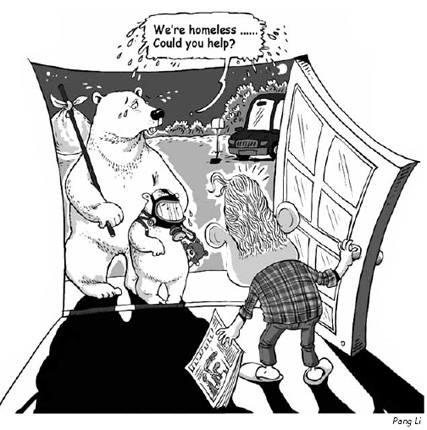Three weeks ago, I visited the Arctic. I saw the remains of a glacier that just a few years ago was a majestic mass of ice. It had collapsed. Not slowly melted - collapsed. I traveled nine hours by ship from the world's northernmost settlement to reach the Polar ice rim. In just a few years, the same ship may be able to sail unimpeded all the way to the North Pole. The Arctic could be virtually ice-free by 2030.
Scientists told me their sobering findings. The Arctic is our canary in the coal mine for climate impacts that will affect us all. I was alarmed by the rapid pace of change there. Worse still, changes in the Arctic are now accelerating global warming. Thawing permafrost is releasing methane, a greenhouse gas 20 times more powerful than carbon dioxide. Melting ice in Greenland threatens to raise sea levels.
Meanwhile, global greenhouse gas emissions continue to rise.
I am therefore all the more convinced we must act - now.
To that end, on Sept 22 I convened a special summit on climate change at the United Nations for some 100 world leaders - history's largest-ever such gathering of heads of state and government. Their collective challenge: transforming the climate crisis into an opportunity for safer, cleaner, sustainable green growth for all.
The key is Copenhagen, where governments will gather to negotiate a new global climate agreement in December. I will a simple message to convey to leaders: The world needs you to actively push for a fair, effective and ambitious deal in Copenhagen. Fail to act, and we will count the cost for generations to come.
Climate change is the pre-eminent geopolitical issue of our time. It rewrites the global equation for development, peace and prosperity. It threatens markets, economies and development gains. It can deplete food and water supplies, provoke conflict and migration, destabilize fragile societies and even topple governments.

Hyperbole? Not according to the world's best scientists. The Intergovernmental Panel on Climate Change (IPCC) says global greenhouse gas emissions need to peak within 10 years if we are to avoid unleashing powerful, natural forces that are now slipping out of our control.
Ten years is within the political lifetime of many attending the summit. The climate crisis is occurring on their watch.
There is an alternative: sustainable growth based on green technologies and policies that favor low emissions over current carbon-intensive models. Many national stimulus packages devised in the wake of the global economic downturn feature a strong green component that creates jobs and positions countries to excel in the clean energy economy of the 21st century.
Change is in the air. The key lies in a global climate deal to reduce greenhouse gas emissions and limit global temperature rise to a scientifically safe level. A deal to catalyze clean energy growth. Most urgently, an agreement must protect and assist those who are most vulnerable from inevitable climate impacts.
What is needed is political will at the highest levels - presidents, premiers and prime ministers - that translates into rapid progress in the negotiating room. It requires more trust among nations, more imagination, ambition and cooperation.
I expect leaders to roll up their sleeves and speak with - not past - each other. I expect them to intensify efforts to resolve the key political issues that have so far slowed global negotiations to a glacial pace. Ironically, that expression - until recently - connoted slowness. But the glaciers I saw a few weeks ago in the Arctic are melting faster than human progress to preserve them.
We must place the planet's long-term interests ahead of short-term political expediency. National leaders need to be global leaders who take the long view. Today's threats transcend borders. So, too, must our thinking.
Copenhagen need not resolve all the details. But a successful global climate deal must involve all countries, consistent with their capabilities, working toward a common, long-term goal. Here are my benchmarks for success.
First, every country must do its utmost to reduce emissions from all major sources. Industrialized countries have to strengthen their mitigation targets, which are currently nowhere close to what the IPCC says is needed. Developing countries, too, must slow the rise in their emissions and accelerate green growth as part of their strategies to reduce poverty.
Second, a successful deal must help the most vulnerable to adapt to the inevitable impacts of climate change. This is an ethical imperative as well as a smart investment in a more stable, secure world.
Third, developing countries need funding and technology so they can move more quickly toward low-emissions growth. A deal must also unlock private investment, including through carbon markets.
Fourth, resources must be equitably managed and deployed in a way that all countries have a voice.
This year at Copenhagen, we have a powerful opportunity to get on the right side of history. It's an opportunity not only to avert disaster, but to launch a fundamental transformation of the global economy.
Strong new political winds now fill our sails. Millions of citizens are mobilized. Savvy businesses are charting a cleaner energy course. We must seize this moment to act boldly on climate change. It may not come again anytime soon.
Change is in the air. Let's seal the deal on a better future for us all.
The author is Secretary-General of the United Nations.
(China Daily September 25, 2009)